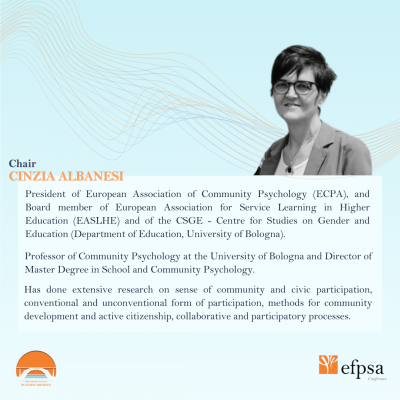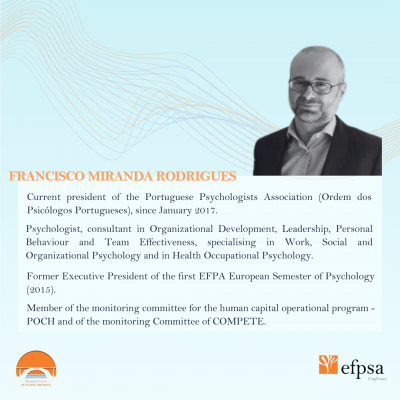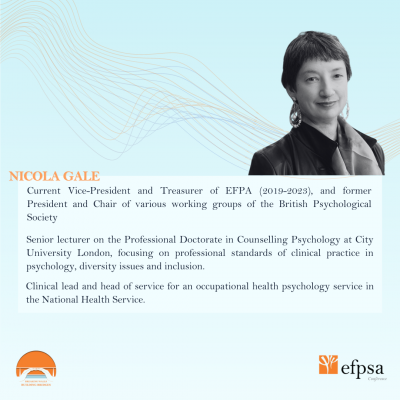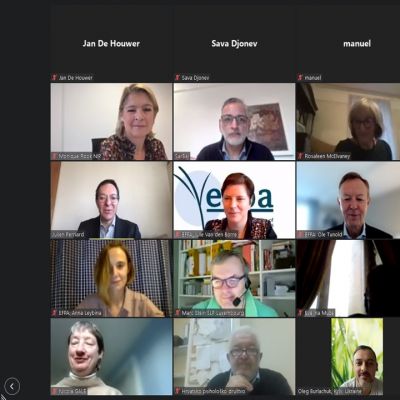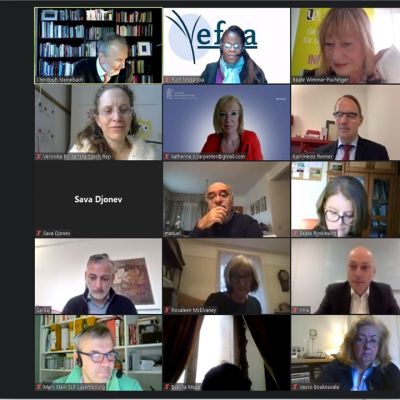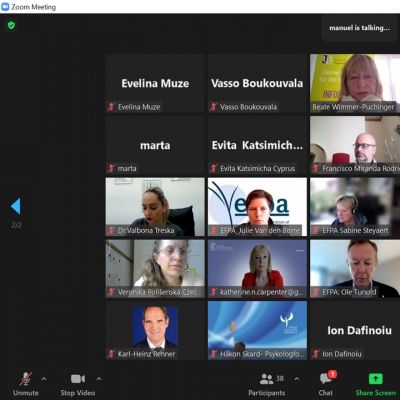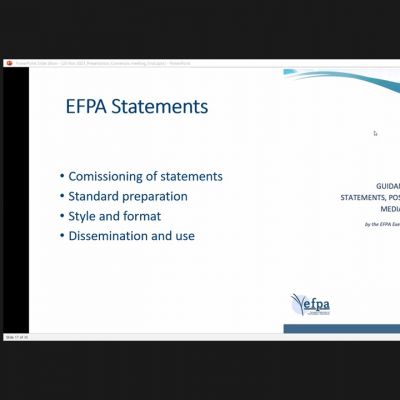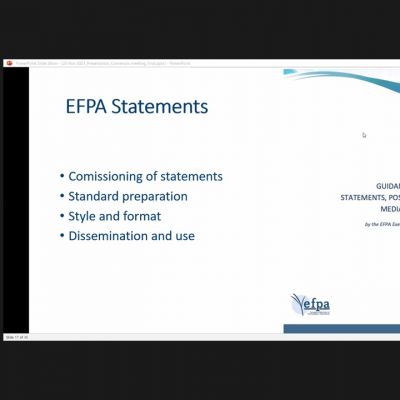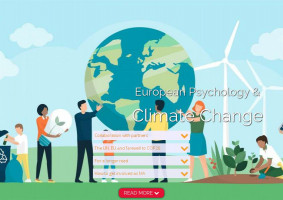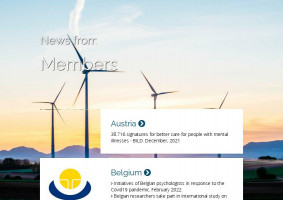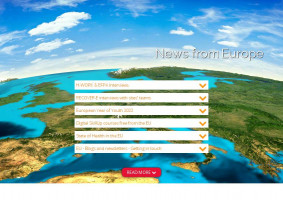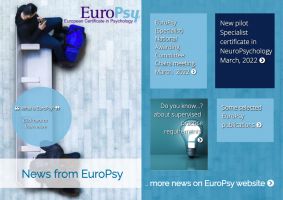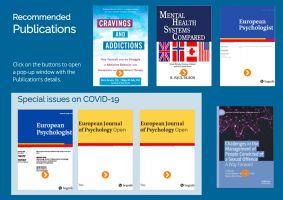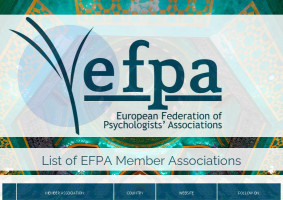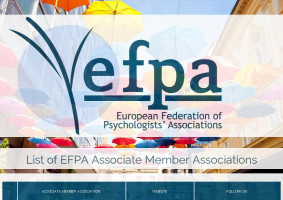READ MORE
_w384_h596_1.jpg)
When the content of this edition of the EFPA Newsmagazine was prepared, the war in Ukraine had not yet begun.
Certainly, we are all deeply affected by the images that reach us from Ukraine. There is no question that such an attack as that of the Russian army on the Ukrainian territory is unprecedented in our time. At the end of November 2019, we had a President's Council Meeting in Kiev. It was the final point of a very informative and stimulating European Semester, which our Ukrainian colleagues had invited us to. During different meetings of our boards and standing committees we all experienced the city, the country and the people and strengthened friendships.
Fear, anxiety, anger unite us, as well as the unanimous rejection of this war. We are glad that many national psychology associations have given a clear signal of solidarity with all those who suffer in this war and its consequences.
The EFPA Executive Council called an extraordinary Presidents’ Council meeting on March 3rd, 2022, in accordance with EFPA statutes. The purpose of this meeting was for Member Associations to provide their advice on the next steps regarding the Russian Psychological Society’s membership status, in response to a request from the National Psychological Association of Ukraine for the Russian Psychological Society to be excluded from EFPA, and many communications from our Member Associations. During that extraordinary Presidents’ Council meeting the EFPA Member Associations supported with a 2/3 majority initiating the process of expelling the Russian Psychological Society from EFPA. Based on the non-binding advice of the Presidents’ Council, the Executive Council the same date has decided to launch the process of expelling the Russian Psychological Society from EFPA. This will now proceed to a decision of our General Assembly. Member Associations will therefore be called upon to cast their vote in the decision regarding the Russian Psychological Society’s continued membership during the extraordinary General Assembly to be held on June 1, 2022.
The March issue of our Newsmagazine once again impressively demonstrates why and how we, as psychologists, are active in and for Europe: there is the dialogue with the next generation of psychologists, the congress of students in Portugal, the urgent questions of sustainability and the international cooperation in this field on the occasion of the congress in Glasgow. And then we would like to take the opportunity to report on our EU projects. Especially in the final phase, it becomes clear once again how much expertise, commitment and effort goes into each of these projects. And besides the news of our member associations, we also take a look at the congress in Ljubljana.
We all hope that we will see each other there again, safe, healthy and in good spirits.
Yours
Christoph Steinebach
EFPA President
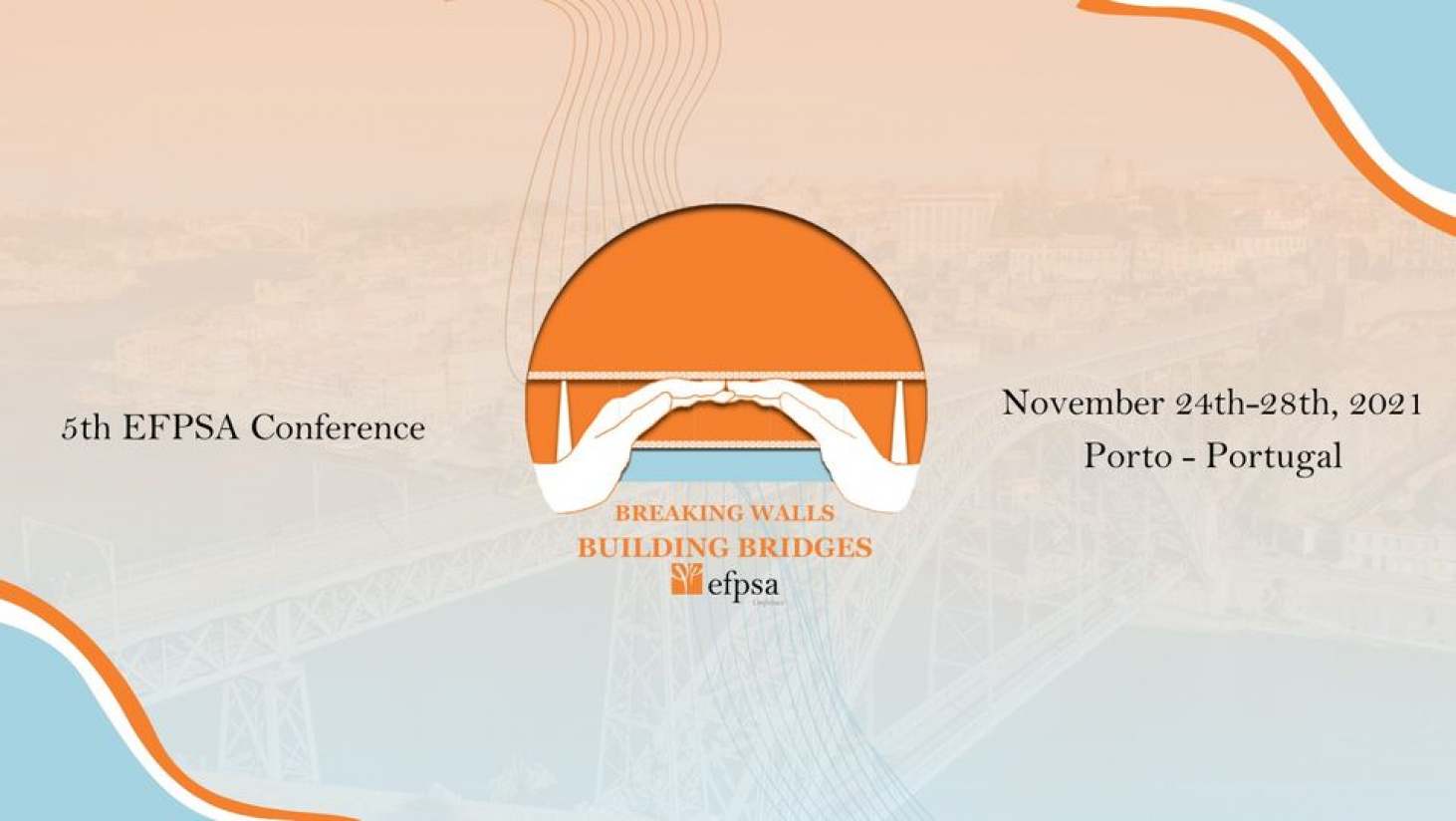
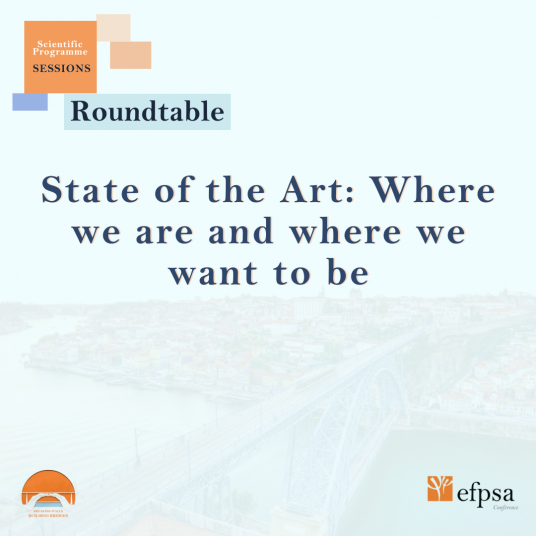
EFPSA conference held in Porto in Portugal in November 2021
by Nicola Gale, EFPA Vice President
EFPA was delighted to join colleagues from across European psychology to speak at the EFPSA conference held in Porto in Portugal on 24th and 25th November 2021. EFPA joined colleagues from Member Association Ordem dos Psicólogos Portugueses of the host country, Associate Member the European Community Psychology Association ECPA, and others in talking about the current state and future of psychology in Europe and how it can be harnessed as a force for societal good.
“State of the Art: Where we are and where we want to be”
The Roundtable “State of the Art: Where we are and where we want to be” was moderated by Cinzia Albanesi President of the European Community Psychology Association, the other speakers were Francisco Miranda Rodrigues President of Ordem dos Psicólogos Portuguese, and Nicola Gale, Vice President and Treasurer of EFPA. Questions were considered relating to how psychology is seen, the impact of the pandemic, future societal challenges, and opportunity for students, to name a few.
-
Cinzia's view - Fold out text
Cinzia reflected that the inspiring motto of the EFPSA Conference, “Breaking walls, Building Bridges,” evokes common aims of Community Psychology (contrasting marginalisation, promoting inclusion and community development). It also evokes one of its methodological footprint, a linking science, in the twofold sense of connecting people, including those at the margins, and different sources of knowledge (disciplines, communities, organisations). A linking science, fostering dialogue and collaboration that has, however, its distinctive features:
- A value-driven approach: engaging with humanity’s problems with creativity, attention to context, respect for diversity, and a quest for social justice.
- A situated multilevel ecological approach: using methods that pay strong attention to the qualities of contexts both in objective and subjective terms and on how people’s experience is situated in contexts.
- An approach that is integrating more and more critical epistemologies.
- An approach that emphasises the individual and collective strengths and capacities and think of them as transformative drivers of change.
The Students of Psychology that we met at the conference, coming from all over Europe, clearly expressed a willingness to be drivers of change and act upon issues like gender equality, access to education, migrations, stigmatisation. With its approach and methodologies, they found that Community Psychology could contribute significantly and asked for comprehensive systematic integration of Community Psychology in the academic curriculum of all psychologists.
-
Francisco's view - Fold out text
For Francisco, the pandemic challenge has given an unprecedented visibility to the profession and allowed psychology to reach further. Psychologists reinvented themselves and invested in new working patterns, such as computer-mediated intervention. The community has had access to new information solutions (e.g. www.eusinto.me) and psychological support (e.g. SNS24 Psychological Counselling Line), in a huge increase in demand, suggesting that stigma does not live in the perception of psychological support, but rather in the non-existence and/or inaccessibility of such support. Aligned with the conference's motto, "breaking walls, building bridges", we discussed the profession's identity and the relevance of seeking a common ground that promotes the union of all and brings clarity to the understanding of our role and value. First of all, we are all psychologists! (not clinical, neither organisational...).
-
Nicola's view - Fold out text
Nicola’s view was that throughout Europe, psychology as a discipline is vibrant. It is one of the most popular subjects in higher education, there is a lot of demand for professional training places. From the point of view of the public, there is increasing acceptance that psychological wellbeing is central to human health and wellbeing, and that getting professional support is OK.
COVID-19 has had an important effect on how psychology is seen.
- There is recognition of the importance of human behaviour in public health, of the importance of considering the mental health impact of public health measures, and this is openly talked about by national and European leaders.
- There is a willingness to set a collaborative research agenda among psychologists to advance the evidence base, engaging with writing rapid reviews, systematic reviews, and improving empirical research methodologies by developing longitudinal studies for example, being able quickly to adapt existing studies.
- Governments are regularly including science as a matter of course, and this includes psychology, alongside economics in their policy and decision making.
There are some big social challenges facing psychology. Many would cite equality and levelling up as important issues, these of course existed before the pandemic but have been exacerbated by it as can be seen from looking at which people have been hardest hit.
Climate change is a major global priority for the political leaders of the world, and is a declared global priority for psychology as well as being one of EFPA’s strategic priorities at the present time. The question might be asked, why are these challenges for psychology and society as a whole? One answer is they are structural long term issues that are harder to solve and less amenable to electorally popular short term fixes. We were asked about the European Green deal which is aimed at transforming the economy of Europe, and what is the place of psychology. A key point is perhaps the commitment to ‘no person and no place left behind’. That means mental and emotional wellbeing, good places to live and work, family and community relationships and connections, all things that psychology deals with.“Contributions of psychological science for evidence-based policies in communities”
The Roundtable “Contributions of psychological science for evidence-based policies in communities” was moderated by Tiago Pereira member of the Board of Directors of Ordem dos Psicólogos Portugueses; the other speakers were Maria Vargas-Moniz Researcher of the Executive Committee of the APPsyCI (Applied Psychology Research Center Capabilities and Inclusion) at ISPA - Instituto Universitário; Roberto Perez Gayo researcher and policy officer at Correlation - European Harm Reduction Network; and Nicola Gale, Vice President of the European Federation of Psychologists’ Associations EFPA.
-
Firstly we hear from Tiago - Fold out text
Tiago described the roundtable as an opportunity to discuss how science based and psychological evidence could improve social and community policies. He emphasised how the comprehension of human behaviour and decision making is indispensable for public policies in order to face the major societal challenges, and the role of psychology in relation to the UN Sustainable Development Goals.
Effective interventions on the major societal challenges are important to achieve more trust, equal societies, well-being, social cohesion and inclusion for all. He said we still fail as society to take into consideration the levels of poverty and exclusion and we need to empower and promote the role of civil society on that and to guarantee more evidence based policies, community interventions and public polices informed by psychological science.-
Maria’s reflections follow - Fold out text
Maria reflected that the participation in the roundtable debates and the Q & A session with the EFPSA representatives in Oporto was vivid, and relevant for the joint action on Community Psychology in European Universities.
The students proposed a call for action towards training opportunities in this field of Psychology. We believe that Community Psychology has a role to play in (in)forming social policies; our experience has been anchored in three main strategies:
a) training and local/ transnational networking;
b) participating/coordinating within consortia for research and action;
c) concrete intervention to inform social policies.
The generation and co-creation of joint action in Community Psychology across Europe have been aspirational for ECPA (European Community Psychology Association), and the EFPA Community Psychology Standing Committee articulated efforts. There were valuable contributions of which we would emphasise the valuable contribution by Roerhle et al. (2020) in the European Psychologist, but with limited outreach. The advocacy for Community Psychology in European HEI is crucial for the future of the discipline in theory, research, and also for action.
On the transnational and local training opportunities with key experts, it is crucial to generate dynamics involving several generations gathered around severe and persistent social problems as homelessness, migrations, deinstitutionalisation, interpersonal violence, including violence against women, and many other pressing social issues with a transformational and sustainable approach to social change and development.
Concerning the active participation in European and Pan-European Research Network, we believe it represents an opportunity to affirm Community Psychology both as a science, including the science of implementation and evaluation, and combine/ merge knowledge with other Sciences. These dynamics increase the capacity to produce larger-scale impacts.
The capacity to develop concrete community and evidence-based programmes and practices as key exemplars of lived-community psychology is relevant to demonstrate that communities are not mere abstractions of ideal social contexts. Communities are contexts where successes and failures, including unexpected effects, exist and need to be analysed and scrutinised.
In terms of future challenges, we need to mind how climate change impacts the lives of real people; therefore we need to provide to the next generations of psychologists the capacity to co-construct initiatives that consider the contributions and leadership of younger generations to inspire and (in)form innovative social policies.-
Nicola's view - Fold out text
Nicola’s comments conclude our review of the eventIn order to be effective at the European level in contributing psychological science to policy, it is important to organise. This is true also at the national and global levels, and would apply to most third sector / civil society or membership organisations that wish to make an impact.
An important consideration is that Europe is a complex region, historically, and culturally. There are 47 countries in the Council of Europe, 27 of which are in the EU. Thinking about psychology, EFPA has 38 member countries out of the 47, including all of the 27. This means some 300,000 psychologists, with their different needs, opinions and ambitions, diverse sub specialisms and therefore identities within the discipline, are within its umbrella.
This breadth, diversity and sometimes competition can mean it is hard to show the outside world what psychology can offer and what its message is. Often, organisations lobby for a particular population, or issue. Psychology however ranges across all people of different cultures, ages, occupations … and a huge breadth of issues such as health, education, the world of work, sport, traffic … . One way communicate a recognisable message from psychology is to major on cross cutting aspects such as prevention; another is to focus for a time on specific campaigns, such as (and this is a focus for many associations this year) what psychology can contribute to tackling the climate crisis.
The focus of this round table was evidence based policies within communities. What can get in the way of using evidence based solutions? Barriers can exist within the authorities, community, and indeed psychologists ourselves. How things have always been done, what is popular, intuitively obvious, may not be the right approach. When faced with a new problem especially a crisis to address, specific evidence may already exist (for example in systematic reviews). What is generically known can be repurposed. It is also important to identify early the gaps where further research is needed and how those can be filled. How are evidence based interventions for communities chosen? Engagement is needed, to draw on local knowledge, cultural and situational fit, to adapt. It is important to foster trust in science, understanding of the scientific method, how scientific consensus is arrived at, and have trusted local figures to communicate.
All this can help to ‘break walls’ and ‘build bridges’.
-
-
- There is recognition of the importance of human behaviour in public health, of the importance of considering the mental health impact of public health measures, and this is openly talked about by national and European leaders.
-
EFPA Presidents Council meeting
November 19, 2021
On November 19, 2021, a virtual Presidents Council meeting took place where the preparation of EFPA’s virtual General Assembly of December 10, 2021 was discussed. Furthermore, information was shared related to the ECP 2022 and EFPA’s planned events during the congress. Other topics handled during the meeting were EFPA’s field of action (European Year of Mental Health and climate Change), the state of affairs of the nominations for the EFPA working groups for the mandate 2021-2023, EuroPsy, psychotherapy and EFPA’s involvement in EU projects. This meeting was again an opportunity for the member associations to share information on what is going on in their association.The next Presidents Council meeting will take place on Friday, May 6, 2022
EFPA Convenors meeting
November 26, 2021
On November 26, 2021 a virtual Convenors meeting took place where the 2021-2023 working group guidelines and the new templates for workplans and final reports were presented and discussed. The revised guidelines have been put in line with EFPA’s activity agenda for 2021-2023 where the focus is put on two main strategic fields of action, i.e., the European Year of Mental Health and Climate Change. More information was also given on how to prepare, disseminate and use EFPA statements and the current state of affairs of the new EFPA website and the next steps were presented.The next convenors meeting will be held on Monday, November 28, 2022.
Welcome to Ljubljana!
Tired of online meetings and virtual conferences? If so, we have great news for you! The 17th European Congress of Psychology in Ljubljana, Slovenia, will be held in-person. It is time to save the date in your personal calendar, register on our website, and get ready to spend some quality time this summer in Ljubljana, attending the EFPA’s 17th European Congress of Psychology.
This is the opportunity to visit one of the most beautiful mid-sized cities and Best European Destination 2022 . At ECP2022 in Ljubljana, you will meet psychologists from all around the world, make new connections, and exchange knowledge. At the Congress, you will also learn about the latest developments in the world of psychology and have a chance for professional development.
As psychologists, we know how important it is to socialize and we are happy that at our Congress you will have a chance to socialize in person rather than online. This is one of the reasons why psychologists are super excited about this congress.
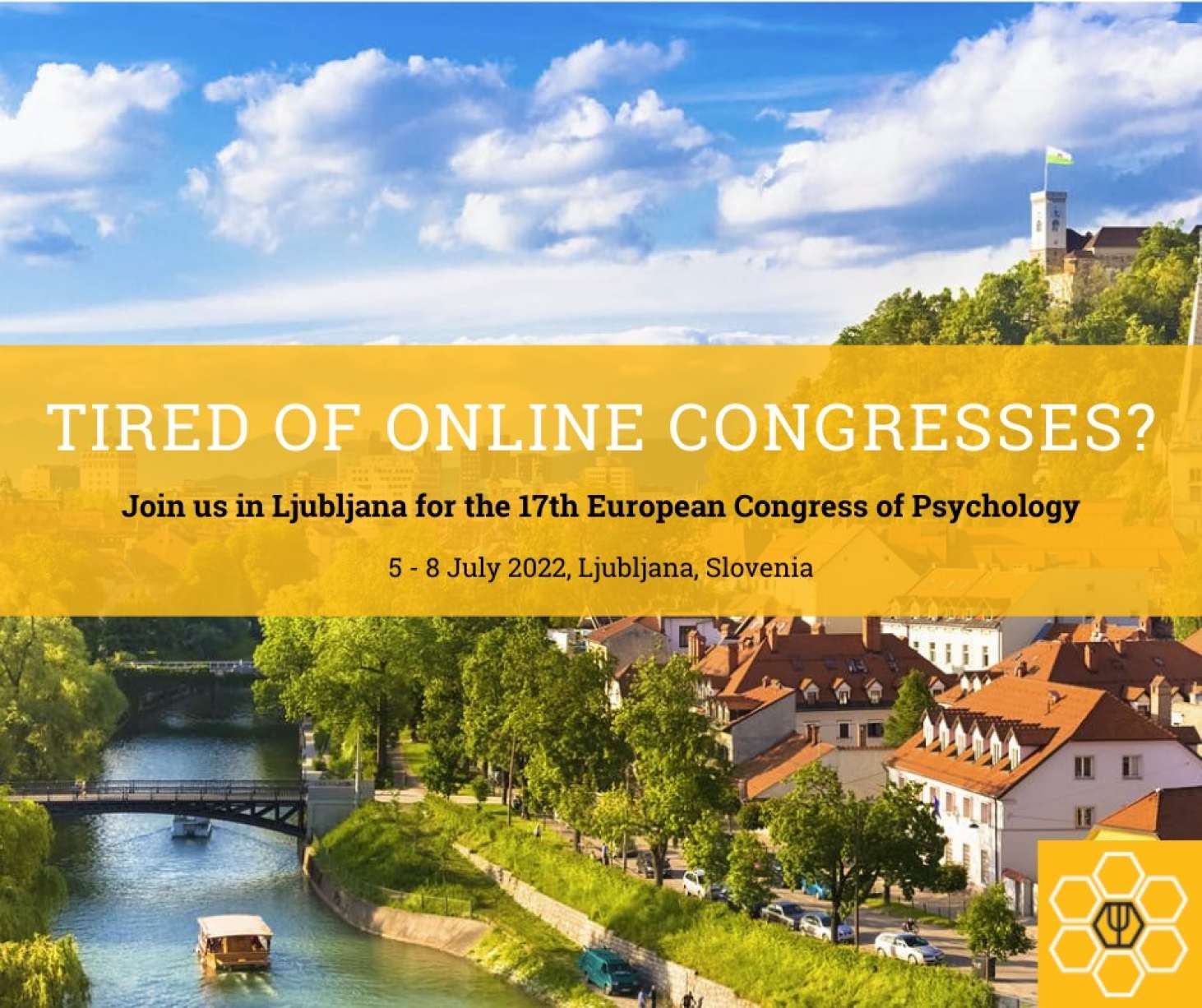
Keynote speakers
The 17th European Congress is not going to be special only because it will be the first psychological congress that will happen in person after quite some time, but it will also be special because of our keynote speakers! These are the scientists who have made groundbreaking research and on the Congress, you will have the opportunity to listen to them while they will be first hand talking about their work. And not only that, you will have a chance to meet them in person, ask them questions, talk to them, discuss with them, and most importantly, to learn from them.
See here this year's keynote speakers
Watch a video about the Congress and follow us on our social media
We would like to invite you to watch our teaser video about the congress. In the short video, you will see all that you need to know about the 17th European Congress of Psychology and at the same time, you will see the stunning images of Ljubljana. And don’t forget to follow us on our social media.
Watch video
Covid updateI
It looks like Covid-19 pandemics is coming to an end. The World Health Organization's (WHO) Europe director says the continent could soon enter a "long period of tranquillity" in the Covid-19 pandemic. Dr. Hans Kluge cited high vaccination rates, the end of winter, and the less severe nature of the Omicron variant. Speaking to reporters, he said: "This period of higher protection should be seen as a 'ceasefire' that could bring us enduring peace." He also said that he was confident the continent would be in a "better position... even with a more virulent variant" than Omicron (source: BBC news, February 3rd, 2022).
See you in Ljubljana!
Finally, we would like to invite you to register as a participant and join us in Ljubljana! Now you have the opportunity to enjoy the congress by paying the lowest, early-bird fee. The registration form for participants is already open.
Click here to enjoy a special early bird fee

Early bird fee extended until March 31, 2022
We have decided to extend the period for the early bird fee! Now you can register as a participant until 31 March and still enjoy ECP2022 at the best price. Click here to enjoy a special early bird fee
Follow us on

(1)_w1700_h406_1.png)
